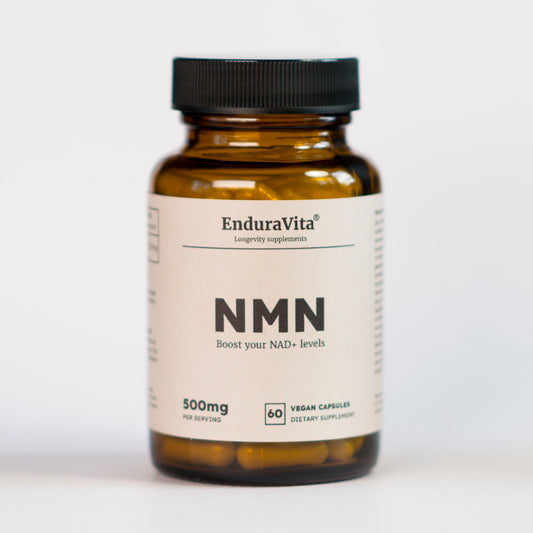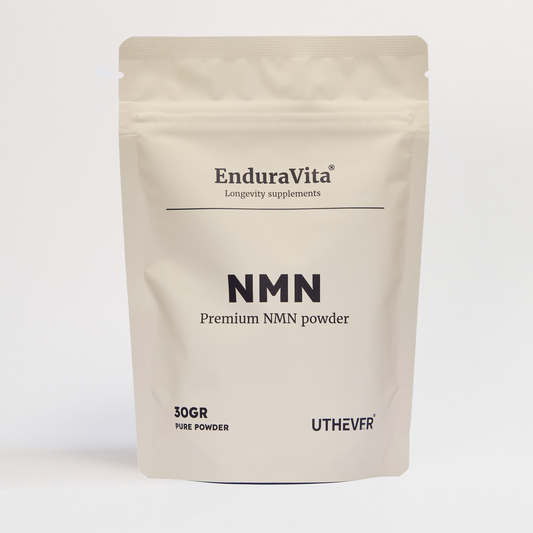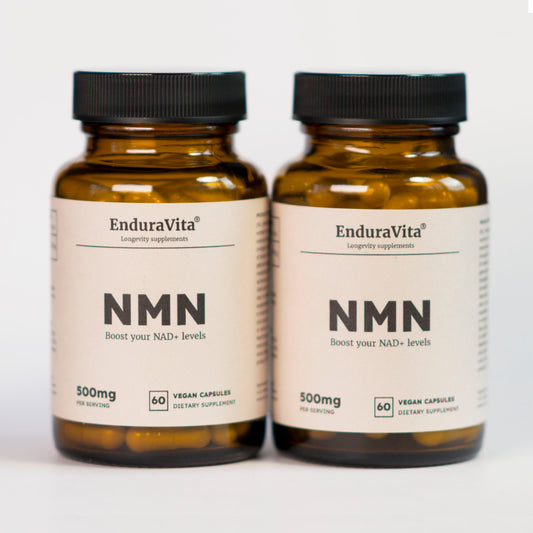
Sleep and longevity
Did you know that someone who lives to be 90 years old spends an average of about 32 years sleeping? That may seem like a lot, but sleep is not a waste of time. It is one of the most active recovery processes your body knows. During your sleep, a lot of work is done on recovery, renewal, and balance. And there is increasing evidence that good sleep also contributes to a longer and healthier life.
In this article, you will read how sleep affects your health and your Longevity. We explain what happens when you sleep, why the sleep cycle and REM sleep are important, and how you can improve your sleep quality.

What happens when you sleep?
Although your consciousness takes a break, your body is actively engaged. Every night, various processes occur that contribute to your recovery:
Muscle and tissue recovery: During deep sleep, damaged cells are repaired and growth hormone is produced. Important for recovery after sports or illness.
Building the immune system: At night, your body produces immune cells and anti-inflammatory substances. Sleep deprivation can disrupt this process and make you more susceptible to infections.
Tissue and muscle recovery:
During deep NREM sleep, damaged tissues are repaired, muscle cells are built, and growth hormone is released. This makes sleep essential for physical rejuvenation and recovery, especially after sports or illness.Cell renewal & immune system:
At night, your body produces immune cells and cytokines that fight infections and reduce inflammation. Chronic sleep deprivation suppresses this immune function and makes you more susceptible to diseases.Brain cleansing (glymphatic system):
During sleep, your brain flushes out waste products like beta-amyloid – a protein associated with Alzheimer's. This natural detox process is only active during deep sleep.Memory, learning & emotional processing:
In REM sleep, your brain processes information, stores memories, and structures emotions. Sleep deprivation disrupts these processes, leading to mood swings, forgetfulness, and concentration problems.Cardiovascular recovery:
During sleep, your blood pressure and heart rate decrease. This literally gives the heart a moment of rest, reducing the risk of cardiovascular diseases.Hormonal balance:
Sleep regulates, among other things, ghrelin (hunger hormone), leptin (satiety), and cortisol (stress hormone). Poor sleep → more hunger, more stress, greater chance of weight gain.Circadian rhythm synchronization:
Your internal clock determines, among other things, your energy level, appetite, and mood. Sleep keeps this rhythm in balance. Disturbed sleep also disrupts your biological clock, similar to chronic jet lag.- Skin & appearance
During sleep, collagen is produced, skin blood flow improves, and oxidative damage is repaired. Lack of sleep accelerates skin aging → wrinkles, dull complexion, sagging.
How does the sleep cycle work?
Sleep occurs in cycles of an average of 90 minutes. Each night you go through several of these cycles. Each cycle consists of four phases:
Phase 1(light NREM): your body relaxes and your breathing slows down.
Phase 2(light NREM): your heart rate and body temperature decrease.
Phase 3 (deep NREM): physical recovery, cell renewal, and immune function.
Phase 4 (REM sleep): dreaming, memory processing, and emotional regulation.
For optimal sleep, it is important to go through these cycles uninterrupted. Waking up frequently or having difficulty falling asleep disrupts this process.
The sleep cycle and REM sleep
A good night's sleep consists of multiple sleep cycles, each lasting about 90 minutes. During such a cycle, you go through four stages, from light sleep to deep sleep and finally REM sleep. Most physical recovery processes occur during deep sleep, while the REM phase is especially important for your memory, creativity, and emotional balance.
You need several of these cycles per night to truly rest well. If you wake up often or have trouble falling asleep, you miss valuable time in those deeper sleep stages.
What is the best sleep time?
There is a review study (Chaput et al., 2018) that looked at how much sleep people need at different ages.¹ The researchers conclude that there is no “one size fits all” for sleep duration. People vary greatly in how much sleep they need to feel alert during the day. Those who get enough sleep wake up rested and function better throughout the day.¹
The study also emphasizes that besides the amount of sleep, the quality, regularity, and timing of going to bed are equally important.¹
Newborns sometimes sleep up to 17 hours a day. Adults need an average of 7 to 9 hours. In older adults, sleep is often less deep, but that doesn't mean they need less sleep.
Is 6 hours enough? For most people, no. You are probably getting too little deep sleep or REM sleep. So it's not just about the number of hours. Regularity and quality also play a big role. Those who go to bed at different times, look at screens a lot before sleeping, or are bothered by light and noise often feel less rested.

What is the effect of sleep on Longevity?
In a large study of over 172,000 people conducted by the American College of Cardiology, it was found that good sleep habits are associated with a higher life expectancy². Men with five healthy sleep habits lived an average of 4.7 years longer. For women, it was 2.4 years.
What were those five habits?
7–8 hours of sleep per night
No trouble falling asleep or staying asleep
No sleep medication
Waking up rested (at least 5 times a week)
According to the researchers, 8% of all deaths in the study population could be linked to poor sleep. They also emphasize that more research is needed, especially on differences between men and women.
Sleep as an investment in yourself
Good sleep is not an extra. It is just as important as eating, drinking, and exercising. Yet it is often underestimated. Many people still see sleep as something you can "catch up on" or "less important than being productive." But that is a misconception. Sleep supports almost every system in your body. Your brain, heart, immune system, and even your skin recover at night.
What does this mean for Longevity? Sleep is also important for healthy aging. It supports your recovery, immunity, memory, and energy levels. Not sleeping, or sleeping too little, leaves traces in the long term.
Sources
Chaput, J.-P., Dutil, C., & Sampasa‑Kanyinga, H. (2018). Sleeping hours: What is the ideal number and how does age impact this? Nature and Science of Sleep, 10, 421‑430. https://doi.org/10.2147/NSS.S163071
- American College of Cardiology. (2023). Getting Good Sleep Could Add Years to Your Life. https://www.acc.org/About-ACC/Press-Releases/2023/02/22/21/35/Getting-Good-Sleep-Could-Add-Years-to-Your-Life










